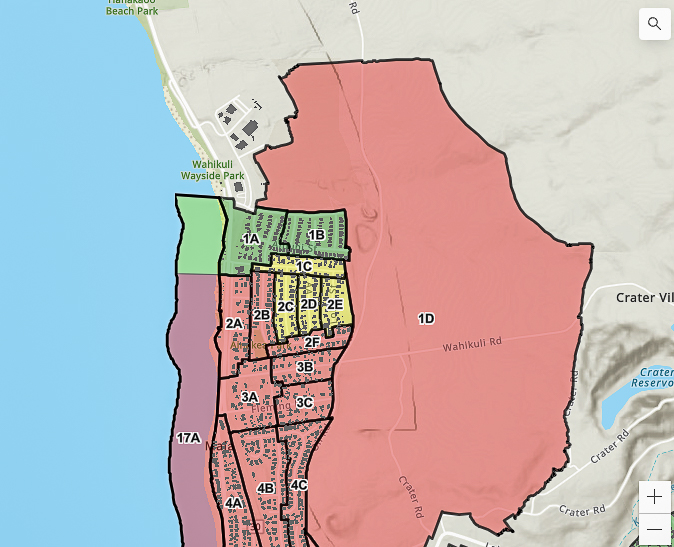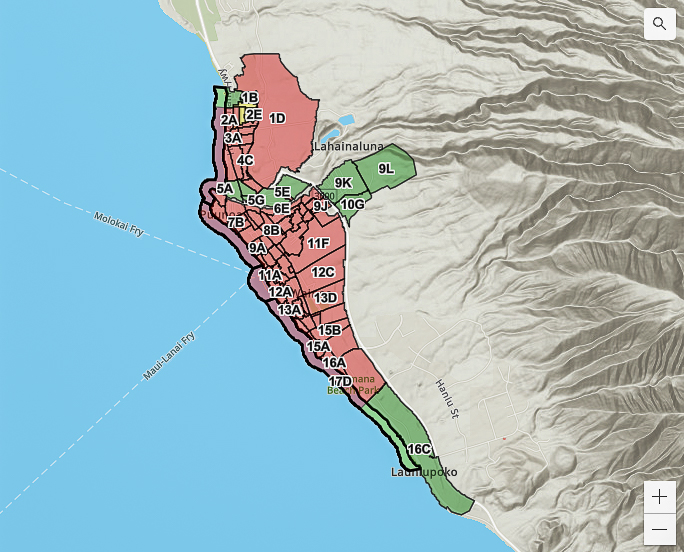Maui County says it will be ‘picking up the pace’ of its reentry program into Lahaina burn zone

While the temperature was still cool at 7 a.m. on Monday, about 60 Lahaina residents who live in three newly opened burn zones — 2C, 2D and 2E — began returning to their homes to survey the damage from the Aug. 8 fire and sift through the debris for anything meaningful that had survived.
One woman found her jewelry box. Inside was her wedding ring.
“A nice moment there; some closure for them,” said Darryl Oliveira, interim administrator for Maui Emergency Management Agency, who witnessed the sentimental discovery.
But for thousands of others who also were displaced from their homes nearly two months ago, they continue to anxiously wait for their opportunity to return to their properties — for their chance for closure.
Oliveira said Maui County is working with partner agencies to speed up the return process, which began Sept. 25 with the first zone, 1C, with 25 parcels along Kaniau Road and continued Monday with the three new adjacent zones. They consist of 72 properties on Kuuipo, Aa and Lokia streets, where about 250 people once lived.
By 10 a.m. Monday, more than 40 vehicles and 100 people had returned to those zones in the north end of the burn area.
“We’re looking at expanding our capability and capacity: opening up more zones, bigger areas, and being a little faster because we really want to get people back to their properties,” Oliveira said.
This includes getting residents back to properties that survived the fire — although they are without working water, sewer and electric.
“We want them to be able to start to clean their properties, work with their insurance companies, etc.,” Oliveira said.
Before residents safely can return to the burn area, the US Environmental Protection Agency must remove visible hazardous material, which it is doing at a fairly rapid pace. Oliveira said as of Saturday, the EPA had cleared 972 parcels, about 50% of the residential area.
The hazardous material is cleared off the property and put on the street, where it is picked up by the US Army Corps of Engineers, which is spearheading the regular debris removal. That removal effort has not begun and will require written entry permission from property owners.
The EPA cleanup is working on zones that start in the north, east and south sections of the approximately 5-square-mile burn area and “just squeezing in” to the center that is the commercial area around Front Street.
The commercial section is where it “gets a little more complicated with larger structures that are collapsed and have different types of debris,” Oliveira said.
Maui County also is looking at opening up zones in the southern end of the burn area, where more properties survived the fire.
“We like to start getting people back to those structures, whether they be property management with some of the townhouses and rental units, as well as those residential structures like some of the smaller subdivisions,” Oliveira said.
“… But we’re also coordinating return or restoration of power. At least for those that go back to clean and do what they need to do to get their home ready for reuse, they can work at night with lights in a much safer environment.”
To speed up the process, and make it easier on residents, the county will be opening up more places and more days to pick up reentry passes.
“Again, we’re going to be picking up the pace and trying to get people back sooner,” Oliveira said.
The county put in a place a program two weeks ago to help people return physically and mentally to their destroyed homes.
For the first two visits, residents and businesses are being escorted into the area, with mental health counselors, medical personnel and translators providing support. Property owners and renters can return on their own after that.
People are being told about the hazards, as far as the dust and air-borne particulate, and have access to a disposable Tyvek coverall, booties and a respirator or N95 mask. Water and portable bathrooms also will be available.
The county already has made adjustments to the time or reentry, starting a half hour earlier at 7 a.m. when it is cooler.
“It is hot again, so we’re advising people coming in to be hydrated,” Oliveira said. “We have water and other things on site here, including portable restrooms, or wash stations, etc. But just being prepared of the heat and the temperatures out here because wearing the personal protective equipment, it gets pretty hot.”














